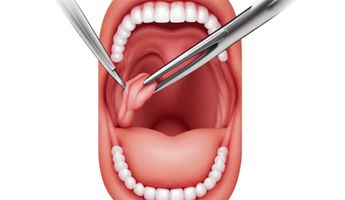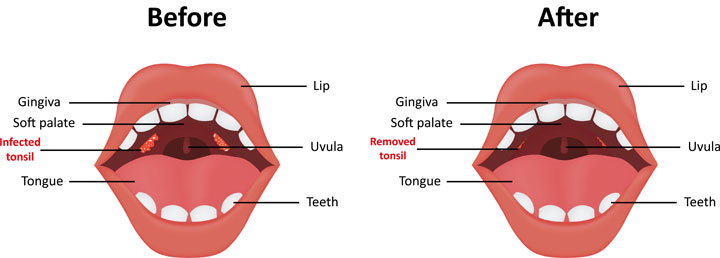Tonsillectomy in Bahamas
Search and Compare the Best Clinics and Doctors at the Lowest Prices for Tonsillectomy in Bahamas

Find the best clinics for Tonsillectomy in Bahamas
No clinics available
Morocco offers the best prices Worldwide
Price: $ 308

- Home
- Bahamas
WHY US?
At Medijump, we're making medical easy. You can search, compare, discuss, and book your medical all in one place. We open the door to the best medical providers worldwide, saving you time and energy along the way, and it's all for FREE, no hidden fees, and no price markups guaranteed. So what are you waiting for?

Free

Best Price

Widest Selection

Risk-Free
What you need to know about Tonsillectomy in Bahamas

Tonsillectomy is a surgical procedure to remove the tonsils – the two oval-shaped pads of tissue located at the back of the throat. The procedure is usually performed to treat recurring or chronic inflammation and infection of the tonsils (known as tonsillitis), but it can also be done to treat breathing problems related to swollen tonsils, sleep apnea, cancer of the tonsils, bleeding of the tonsils, as well as frequent and loud snoring.
What does a Tonsillectomy Procedure Involve?
Tonsillectomy is performed under general anesthetic, so you will not feel any pain during the surgery. There are two ways to perform a tonsillectomy. The most common way is to use a blade or scalpel to cut out the tonsils. The other way is to use a specialized surgical tool that uses soundwaves, or high-powered energy heat to destroy or remove the tissues and stop any bleeding.
How Long Should I Stay in Bahamas for a Tonsillectomy Procedure?
Unless there is a complication that occurs after the surgery, you should be able to leave the hospital on the same day. However, plan to stay in Bahamas for about 5 to 10 days for initial recovery and follow-up hospital checkups as your surgeon will monitor the healing progress.
What's the Recovery Time for Tonsillectomy Procedures in Bahamas?
The total recovery period can take about two weeks, but most people are able to go back to work or school and resume most of their normal routine within 5-7 days. Avoid any strenuous activities, such as intense exercise and heavy lifting for a few weeks following the surgery to avoid any complications. Your surgeon will give you a detailed recovery timeline for you.
What sort of Aftercare is Required for Tonsillectomy Procedures in Bahamas?
Make sure to take pain medications as prescribed by your surgeon and drink plenty of water to avoid dehydration. You may need to avoid hard, crunchy, acidic, or spicy foods for a while, and your surgeon may give you a dietary plan. Talk to your surgeon about any activities that you need to avoid to prevent tonsillitis from recurring.
What's the Success Rate of Tonsillectomy Procedures in Bahamas?
Tonsillectomy is generally safe and highly successful. The morbidity rates of the procedure range from 1.5% to 1.4%. However, like other types of surgeries, there are side effects and risks that you should not overlook, including swelling, bleeding during healing, bleeding during surgery, reactions to anesthetics, infection, and sore throat.
Are there Alternatives to Tonsillectomy Procedures in Bahamas?
In some cases, tonsillitis that is not severe and only happened once does not need a tonsillectomy. For other conditions, your alternative depends on the disease you used the procedure for. For instance, if you have sleep apnea, your doctor may suggest you undergo nasal surgery, tongue surgery, or bone surgery. If you need to undergo the procedure because of cancer, your doctor may recommend chemotherapy, immunotherapy, and radiation therapy.
What Should You Expect Before and After the Procedure
Having a problem in your tonsils can be uncomfortable, causes painful symptoms, and it can also lead to other dangerous complications. After the procedure, all of your symptoms should be relieved and your risk of dangerous complications is significantly reduced.
Whilst the information presented here has been accurately sourced and verified by a medical professional for its accuracy, it is still advised to consult with your doctor before pursuing a medical treatment at one of the listed medical providers
No Time?
Tell us what you're looking for and we'll reachout to the top clinics all at once
Enquire Now

Popular Procedures in Bahamas
Prices Start From $8,031

Prices Start From $404

Prices Start From $18

Recommended Medical Centers in Bahamas for procedures similar to Tonsillectomy

- Interpreter services
- Translation service
- Religious facilities
- Medical records transfer
- Medical travel insurance
- Health insurance coordination
- TV in the room
- Safe in the room
- Phone in the room
- Private rooms for patients available
Tonsillectomy in and around Bahamas
The Bahamas is an archipelago and country on the northwestern edge of the West Indies. Having more than 700 beautiful, palm-fringed islands, this country is known for its stunning beaches, coral reefs, crystal clear waters, a myriad of bird species, and historic towns. With everything that it has to offer, it is easy to see why the Bahamas welcomes millions of visitors each year. Besides honeymooners, divers, and beach-goers, the Bahamas is also popular among medical tourists thanks to its exceptionally high-quality services. The country’s booming medical tourism industry is driven by its highly-skilled medical professionals and state-of-the-art equipment, combined with cost-effective medical care and the opportunity to recuperate in beautiful surroundings. Cosmetic and plastic surgeries, total knee replacements, and cardiac surgeries are some of the most popular procedures in the Bahamas.
Popular Parts of the Bahamas
Nassau, the capital of the Bahamas, is one of the chief pleasure resorts in the world. Known as the Bahamas’ crown jewel, it boasts a vibrant culture, breathtaking natural landscape, and rich history. Its signature attraction is the beaches, and the most popular is Cable Beach. With striking white sands and blue waters, this peaceful and beautiful beach is the perfect place to relax and sunbathe. Freeport is also a famous destination in the Bahamas. With its diving sites and world-class restaurants, there are many things to see and do in this city. The main draw of Freeport is its beaches. Some of the most popular are Taino and Fortune Beach.
Weather and Climate in the Bahamas
The Bahamas experiences a tropical climate and the average temperatures will stay the same all year round, between 24°C - 29°C. There are generally two seasons in the country: dry and wet. The dry season, from November to June, is mostly sunny and pleasant. However, it tends to be very crowded during this season, especially from mid-December to mid-April. The wet season spans from July to November. This season sees an increase in rainfall, but there are still many sunny days. The Bahamas also has a hurricane season, which lasts from June to November.
Getting around in the Bahamas
The largest international gateway to the Bahamas is Lynden Pindling International Airport, which is located near the capital city of Nassau, in western New Providence Island. It serves flights to numerous major cities in the Americas and Europe, including New York, Atlanta, and London. The easiest and quickest way to get around is by plane, especially to travel from one island to another. In Nassau and Freeport, the main transport option is the jitneys (private minibusses). In Out Islands, no public transport is available. The best way to get around inside the islands is by taxis or rental cars. However, taxis are often quicker and easier than driving on your own. Ferries and water taxis are all available.
Tourist Visas in the Bahamas
Citizens of 120 countries, including all EU countries, Australia, Canada, China, the US, and the UK, can visit and stay in the Bahamas for up to 3 months without a visa unless stated otherwise. Nationals not listed in the visa-exempt agreement need to obtain a visa to be able to visit the Bahamas.
Additional Information
- Local Currency: The Bahamian dollar (BSD) is the official currency, which is equivalent in value to the US dollar. Bahamian dollar and US dollars are accepted interchangeably in the country.
- Money & Payments: ATMs are widely available on the major islands and can usually be found in airport terminals and at banks. Credit cards are widely accepted. Tipping is expected, usually around 15% for taxi drivers and waiters, and $1-$3 for bag porters and hotel maids.
- Local Language: English is the official language in the Bahamas.
- Local Culture and Religion: Bahamians are deeply religious and the biggest religion is Christianity. However, the constitution guarantees freedom of expression, and other religions are freely practiced.
- Public holidays: Some of the most important holidays in the Bahamas are Whit Monday, National Heroes Day, Randol Fawkes Labour Day, Emancipation Day, Independence Day, Christmas Day, Boxing Day, New Year’s Day, and Majority Rule Day.
Popular Searches
- Plastic Surgery in Thailand
- Dental Implants in Thailand
- Hair Transplant in Thailand
- Breast Augmentation Thailand
- Gastric Sleeve in Thailand
- Gender Reassignment Surgery in Thailand
- Laser Hair Removal in Bangkok
- Botox in Bangkok
- Dermatology in Bangkok
- Breast Augmentation in Bangkok
- Coolsculpting in Bangkok
- Veneers in Turkey
- Hair Transplant in Turkey
- Rhinoplasty in Turkey
- Stem Cell Therapy in Mexico
- Rhinoplasty in Mexico
- Liposuction in Mexico
- Coolsculpting in Tijuana
- Rhinoplasty in Korea
- Scar Removal in Korea
- Gastric Sleeve in Turkey
- Bone Marrow Transplant in India
- Invisalign in Malaysia
- Plastic Surgery in the Dominican Republic
- Tummy Tuck in the Dominican Republic
- Plastic and Cosmetic Surgery in Poland
- Rhinoplasty in Poland
- Hair Implant in Poland
- Dental Implants in Poland
- IVF in Turkey